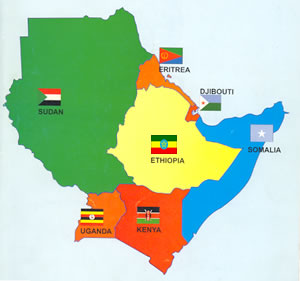
You might hate him, you might love him. You might be clear or confused. You might recognize him, you might not. You might care or not care. But in any case, all you can really say is: what a leader.
Imagine you had the opportunity to go on internationally broadcasted news and say what you want to say about Western hypocrisy? About crippling aid dependence. About self-reliance for domestic and sustainable food security? About U.S. intervention. Isaias Afewerki, Eritrea’s PFDJ strongman is saying and doing things his way. And he’s speaking for more Africans than you think. He doesn’t do sugar-coated diplomacy. He says with a Devil May Care attitude what’s on most people’s minds regarding the problems of today’s Africa. Tonight I watched an interview on Al-Jazeera – Andrew Simmons and Isaias Afewerki. It was the ultimate encounter! The family room, filled with guests, hushed. People came in, we nodded our heads in acknowledgement and shushhed them, lest we miss a nanosecond of this interaction. It was filled with both silent and spoken resistance from either side, interviewer and interviewee. The phone rang and we silenced the ringer. We were entranced. Some people clapped after a few key phrases the President likes to repeat such as Leave Us Alone. The body language during the interview made it all the more intense: stiff necks, defensive posture, sturdy gazes, dismissive gestures. For many of us, it was the first time in a very long time (especially since EriTV left us…) that we could hear straight from the horse’s mouth. Isaias Afewerki is talking. Finally.
So what did he say? Here’s a portion from Al-Jazeera.
He is an anti-interventionist in Sudan. An anti-interventionist in Somalia. A supporter of Sudanese faction groups looking for a way toward a more united Sudan. A proponent of AU objectives for peacekeeping missions. (He repeated, for what? what would be the purpose?) An advocate, in a very unpretentious way, of regional cooperation for peacebuilding and economic development. (He noted that the absence of a regional organization for peacekeeping does not justify external intervention.)
He’s strong and brilliant – unphased by Western perceptions of Eritrea. The question Eritreans are trying to ask themselves now is – too strong, too brilliant? What is the real cost of this style of leadership? I think what Afewerki is saying is let’s change our attitude about costs. Let’s determine our own costs without looking at the outside and letting the famous acronyms (UN, WB, IMF, ILO, WTO…) do the math for us as Eritreans, as Africans. The only response to Afewerki, like he himself said during the interview about Ethiopians supposedly getting out of Somalia is: time will tell. So shall history take its course.
It’s back to the drawing board for Afewerki regarding the long road to the intangible oasis called “development”. (The chalk is a special import from Cuba, Singapore, North Korea, China?) Read this article for more information on China-Eritrea relations.
A critic can ask: What pre-integrated/pre-globalized/pre-human rights world might he be living in? And the horse will surely respond: Eritrea.









